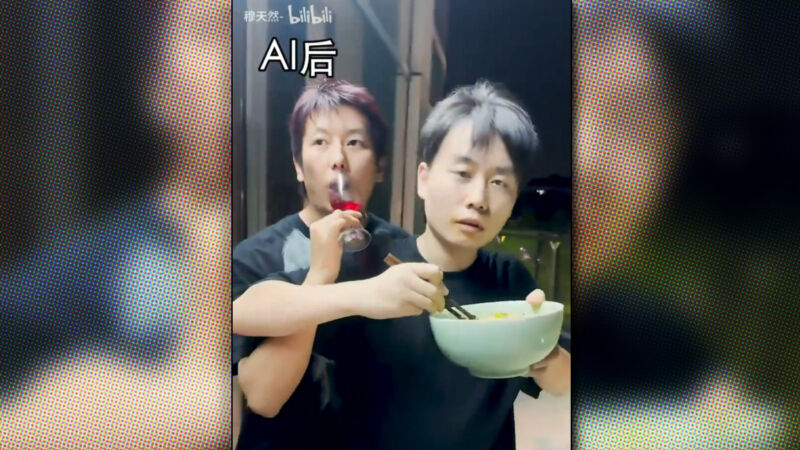Life imitates AI imitating life —
TikTok and Bilibili users transform nonsensical AI glitches into real-world performance art.

Enlarge / Still from a Chinese social media video featuring two people imitating imperfect AI-generated video outputs.
It's no secret that despite significant investment from companies like OpenAI and Runway, AI-generated videos still struggle to achieve convincing realism at times. Some of the most amusing fails end up on social media, which has led to a new response trend on Chinese social media platforms TikTok and Bilibili where users create videos that mock the imperfections of AI-generated content. The trend has since spread to X (formerly Twitter) in the US, where users have been sharing the humorous parodies.
In particular, the videos seem to parody image synthesis videos where subjects seamlessly morph into other people or objects in unexpected and physically impossible ways. Chinese social media replicate these unusual visual non-sequiturs without special effects by positioning their bodies in unusual ways as new and unexpected objects appear on-camera from out of frame.
This exaggerated mimicry has struck a chord with viewers on X, who find the parodies entertaining. User @theGioM shared one video, seen above. "This is high-level performance arts," wrote one X user. "art is imitating life imitating ai, almost shedded a tear." Another commented, "I feel like it still needs a motorcycle the turns into a speedboat and takes off into the sky. Other than that, excellent work."
An example Chinese social media video featuring two people imitating imperfect AI-generated video outputs.
While these parodies poke fun at current limitations, tech companies are actively attempting to overcome them with more training data (examples analyzed by AI models that teach them how to create videos) and computational training time. OpenAI unveiled Sora in February, capable of creating realistic scenes if they closely match examples found in training data. Runway's Gen-3 Alpha suffers a similar fate: It can create brief clips of convincing video within a narrow set of constraints. This means that generated videos of situations outside the dataset often end up hilariously weird.
An AI-generated video that features impossibly-morphing people and animals. Social media users are imitating this style.
It's worth noting that actor Will Smith beat Chinese social media users to this trend in February by poking fun at a horrific 2023 viral AI-generated video that attempted to depict him eating spaghetti. That may also bring back memories of other amusing video synthesis failures, such as May 2023's AI-generated beer commercial, created using Runway's earlier Gen-2 model.
An example Chinese social media video featuring two people imitating imperfect AI-generated video outputs.
While imitating imperfect AI videos may seem strange to some, people regularly make money pretending to be NPCs (non-player characters—a term for computer-controlled video game characters) on TikTok.
For anyone alive during the 1980s, witnessing this fast-changing and often bizarre new media world can cause some cognitive whiplash, but the world is a weird place full of wonders beyond the imagination. "There are more things in Heaven and Earth, Horatio, than are dreamt of in your philosophy," as Hamlet once famously said. "Including people pretending to be video game characters and flawed video synthesis outputs."